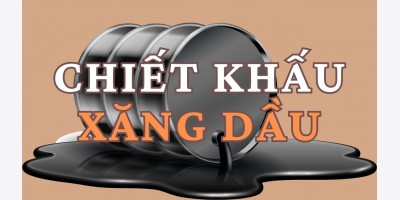Dầu thô tiếp tục phiên giảm giá thứ 3 tại Mỹ
Dầu thô tiếp tục phiên giảm giá thứ 3 tại Mỹ khi có những dấu hiệu cho thấy kinh tế toàn cầu Ä‘ang cháºm lại làm dấy lên lo ngại rằng nhu cầu nhiên liệu có thể giảm.
Giá giao sau hôm nay giảm 0.5% trÆ°á»›c khi Mỹ thông báo doanh thu bán lẻ trong tháng 5 có thể giảm lần đầu tiên trong vòng 11 tháng và sản lượng công nghiệp của Trung Quốc Ä‘ã sụt giảm. Giá hôm qua Ä‘ã giảm xuống mức thấp nhất trong 4 tuần sau khi các số liệu của chính phủ cho thấy tiêu thụ dầu của Trung Quốc trong tháng 5 giảm 4%, Standard & Poor hạ mức Ä‘ánh giá tín dụng quốc gia của Hy Lạp xuống mức thấp nhất CCC.
Dầu thô giao tháng 7 giảm 52 cent xuống 96.78 USD/thùng trong giao dịch Ä‘iện tá» tại sàn New York Mercantile Exchange, đạt 96.85 USD lúc 9:49 giá» Sydney. Hôm qua giá giảm 1.99 USD, tÆ°Æ¡ng Ä‘Æ°Æ¡ng 2 %, xuống mức 97.30 USD, mức thấp nhất từ sau hôm 17/5. So vá»›i năm ngoái, giá Ä‘ã tăng 29%.
Dầu thô Brent giao tháng 7 tăng 32 cent, tÆ°Æ¡ng Ä‘Æ°Æ¡ng 0.3%, xuống còn 119.10 USD/thùng tại sàn ICE Futures Europe. Giao dịch chuẩn châu Âu Ä‘ã đạt mức chênh lệch ká»· lục má»›i 21.80 USD/thùng so vá»›i dầu thô Mỹ.
Theo dá»± báo trung tâm của 81 chuyên gia kinh tế trÆ°á»›c khi Bá»™ ThÆ°Æ¡ng mại công bố số liệu chính thữ hôm nay, doanh số bán lẻ của Mỹ trong tháng 5 có thể giảm 0.5%, sau khi tăng 0.5% trong tháng 4.
Má»™t dá»± báo khác cÅ©ng từ khảo sát của Bloomberg cho rằng trong báo cáo hôm nay, Trung Quốc sẽ công bố sản lượng công nghiệp giảm. Tăng trưởng sản lượng công nghiệp Trung Quốc trong tháng 5 có thể Ä‘ã giảm 13.1% từ mức 13.4% hồi tháng 4. Lạm phát tiêu dùng dá»± báo tăng 5.5% từ 5.3% trong tháng 5.
Hôm qua, Ủy ban Cải cách và Phát triển Quốc gia Trung Quốc Ä‘ã công bố tiêu thụ năng lượng hàng ngày của quốc gia tiêu thụ dầu má» lá»›n thứ 2 thế giá»›i này Ä‘ã giảm xuống còn 650,000 tấn trong tháng 5 trong khi lượng tồn lại tăng Ä‘áng kể.
Crude Oil Declines for a Third Day in New York on Signals Demand Weakening
By Ben Sharples - Jun 14, 2011 6:51 AM GMT+0700
inShare
More Print Email
Oil declined for a third day in New York as signs that the global economy is slowing stoked speculation that fuel demand may falter.
Futures slipped as much as 0.5 percent today before reports that may show sales by U.S. retailers fell in May for the first time in 11 months and China’s industrial production slowed. Prices dropped to a four-week low yesterday after government data showed China’s oil-product consumption slid 4 percent in May and Standard & Poor’s cut Greece’s credit rating to the lowest held by a country.
“Almost every day, there is some fresh economic data that seems to fit better in an anemic recovery than in one that is robust or dynamic,” Peter Beutel, the president of Cameron Hanover Inc., an energy advisory company in New Canaan, Connecticut, said in a note e-mailed today. Oil prices fell because of the “continuing fear that the global recovery may be losing steam and traction.”
Crude for July delivery declined as much as 52 cents to $96.78 a barrel in electronic trading on the New York Mercantile Exchange, and was at $96.85 at 9:49 a.m. Sydney time. The contract yesterday slid $1.99, or 2 percent, to $97.30, the lowest since May 17. Prices are 29 percent higher the past year.
Brent oil for July delivery gained 32 cents, or 0.3 percent, to $119.10 a barrel on the London-based ICE Futures Europe exchange yesterday. The European benchmark contract reached a record premium of $21.80 a barrel to U.S. futures yesterday.
Economic Reports
U.S. advance retail sales may drop 0.5 percent, after a 0.5 percent gain in April, according to the median forecast of 81 economists surveyed by Bloomberg News ahead of Commerce Department data today.
China’s industrial production growth may have slowed to 13.1 percent in May from 13.4 percent in April, a separate Bloomberg survey shows. Consumer price inflation, also scheduled for today, may have climbed to 5.5 percent from 5.3 percent.
China’s National Development and Reform Commission yesterday said the country’s daily consumption of fuels dropped to 650,000 metric tons in May while inventories rose. China is the world’s second-largest oil consumer, after the U.S.
S&P cut Greece’s credit rating to CCC. “There is a significantly higher likelihood of one or more defaults” in the country, the agency said.
U.S. Stockpiles.
The most-active oil option yesterday was the July $90 put, a bet that prices will fall, which ended unchanged at 11 cents. The second-most active contract, the July $95 put, rose 21 cents to 58 cents.
An Energy Department report tomorrow may show U.S. gasoline supplies increased by 1 million barrels from 214.5 million, according to the median of eight analyst estimates in a Bloomberg News survey. Crude stockpiles probably fell 1.75 million barrels, the survey shows.
Royal Dutch Shell Plc’s Nigerian unit has declared force majeure on Bonny Light oil loadings for this month and July because of multiple fires on the Trans Niger pipeline, the company said in an e-mailed statement yesterday.
Shell originally planned to ship 243,333 barrels a day of Bonny Light in June and 204,839 barrels a day next month, according to loading programs obtained by Bloomberg News. Force majeure is a legal clause allowing companies to miss deliveries because of circumstances beyond their control.









